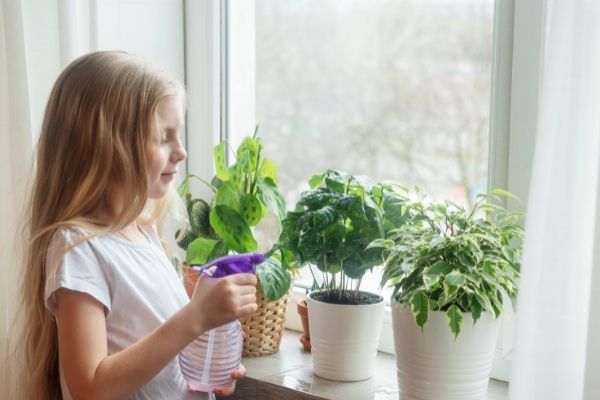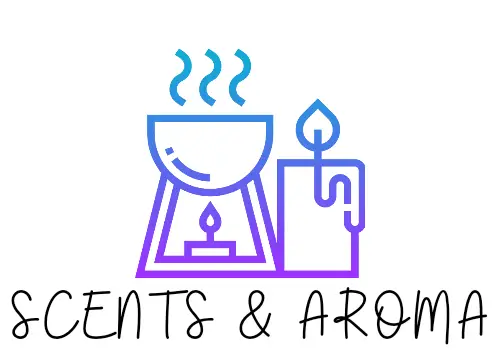Oil diffusers are not known to harm home plants. The essential oils in diffusers are however known to help plants grow, protect them from pests, and improve the quality of their lives and growth. When oil is diffused into the air, it creates a humid environment for plants to grow.
In this article, we’ll be discussing what an oil diffuser is, what they do, if they can be used as humidifiers for plants, if they are useful to plants, and the many benefits they offer plants.

WHAT IS AN OIL DIFFUSER?
An oil diffuser is a device that breaks essential oils down into smaller molecules, dispersing them into the air, spreading the aroma of the essential oil around the room. Unlike other scenting products, products that use essential oils provide the extra benefits of aromatherapy.
There are different types of oil diffusers, some use water in mixing the essential oil while others use carrier oils. Some common types of diffusers are:
- Reed diffusers
- Ultrasonic diffuser
- Heat diffuser
- Nebulizing diffuser.
WHAT DO OIL DIFFUSERS DO?
Basically, what oil diffusers do is break down essential oils into small breathable molecules and disperse them in the form of mist to freshen the air. Oil diffusion has many health benefits like mood lifting, relaxing, and making a person focused.
The nebulizing diffuser product uses pressurized air to break down essential oils while ultrasonic diffusers use ultrasonic vibrations. The reed diffuser is quite different. The reeds are soaked in the oil-filled jar to disperse the scent from the oils. The reed slowly soaks the oil, which is then dispersed into the atmosphere.
Other forms of diffusion like the scented candles use heat which reduces the quality of the scent and the benefit derived from essential oils. Whatever the case, oil diffusers have become a popular way of adding aroma to the room.
CAN OIL DIFFUSERS BE USED AS HUMIDIFIERS FOR PLANTS?
Absolutely, the essential oils in diffusers can be used to create a humid environment for plants. As many people have begun to invest in small home plants due to the difficulty of raising a garden, they may forget to moisturize their plants. Diffuser oils can perform this function but only in small quantities. Thus, the essential oil diffuser will be used in a small closed space to have a noticeable effect on the plant.
The essential oils can even be mixed with water to help with creating moisture for plants not regularly watered. They are best used in places like a plant corner.
If you would like a deeper look at if oil diffusers can be used as humidifiers check out this amazing article I wrote.
WHAT ARE THE SAFETY RISKS INVOLVED IN USING DIFFUSER OILS?
Diffuser oils are generally considered to be safe. Most regulatory bodies in different countries also approve of the safety of these oils for general and public use. However, certain conditions might warrant one to be selective about which type of essential oil to buy when hunting for oils to use in the diffuser.
People who suffer from respiratory conditions like asthma and similar illnesses may be allergic to certain essential oils as these oils are extremely concentrated chemical compounds. Another concern will involve pets commonly, dogs and cats. Some essential oils are harmful to pets.
The essential oils in diffusers may cause irritation, breathing difficulties, and other allergies among pets. A noteworthy piece of advice is to quickly ventilate the environment and carefully dispose of the oils if you notice any allergic reaction. If the symptoms in the pet persist after a few days, it is best to visit the vet.
ARE DIFFUSER OILS HARMFUL TO PLANTS?
Although it is recommended to use high-quality diffusers to get the best results, essential oils generally aren’t harmful to plants. Many of these oils are plant extracts themselves and they can provide benefits to plants. Essential oils are gotten from the leaves, flowers, stems, and roots of other plants and will help home plants to thrive.
THE BENEFITS OF ESSENTIAL OILS TO HOME PLANTS
If you’re wondering whether essential oils have any benefit to home plants, other than moisture, they do. These oils help plants to thrive and combat common problems that home plants can face.
The benefits which essential oils can give to plants include;
- Certain essential oils have chemicals that will sprout plant growth.
- Antifungal chemicals are some of the properties of some essential oils. Such oils inhibit the growth of fungi.
- Some essential oils play the role of pesticides. They keep pests that can harm plants away, such as bugs, weevils, etc
- Diffusing essential oils can also help keep leaves clean and shiny.
- There are essential oils that help to purify the soil and the air making it safer for plant growth.
- Diffuser oils also aid the pollination of outdoor plants. The scents they give off help attract pollinators like bees who help relieve them of pollen grains.
WHICH ESSENTIAL OILS ARE BENEFICIAL TO PLANTS?
Specific plant extracts in essential oil have specific roles that can be beneficial to home plants. So if there are certain oil types you’d like to get, here is a list of the plant extracts and their functions.
- CINNAMON: Cinnamon oil is produced from the leaves, barks, and twigs of cinnamon trees. It has been used as a dietary supplement to alleviate stomach illnesses and even diabetes. It can be consumed in the form of capsules, tea, and food additives. In limited amounts, it is safe for plants. Cinnamon can help in reducing the spread of fungal microbes that are harmful to the growth of plants.
- PEPPERMINT: Peppermint extracts are used for a wide variety of human and plant purposes. The oil hinders the growth of fungi effectively. It also repels pests and insects such as spiders, slugs, snails, flies, and aphids. Humans use peppermint in soaps, cosmetics, and even used to treat body and muscle aches. Its common allergic reactions include heartburn and rashes.
- LAVENDER: Gotten from the Lavandula plant, it is known to be an effective chemical for soaps, body spray, and even medicinal purposes. The extract’s advantage to plants is that it helps to curb the growth of bacteria and fungi.
- OREGANO: The extracts from the oregano plant are effective repellents for pests that fly. This includes mosquitoes and other flies as well.
- TEA TREE: Tea tree products have been of beneficial importance to man. The aboriginal people of Australia use them to treat fungi, acne, and insect bites. For plants, the oils are proficient in repelling various insects
- CEDARWOOD: This type of extract has a particular significance in prolonging the lifespan of plants. Cedarwood oil protects plants from insects that feed on stems and stalks, which are termites and ants, by repelling them. These two insects have been notorious for attacking and destroying home plants.
CAN I DIRECTLY APPLY MY DIFFUSER OILS TO PLANTS?
Yes, this is acceptable. Add a teaspoon of essential oil into the spraying bottle and effectively mix it with water. You can use this method to treat fungal diseases.
CONCLUSION
Oil diffusers are very effective for dispersing essential oil fragrances and pose no major threat to plants. Instead, they help them fight against fungi and bacteria, repel pests and humidify plants. Oil diffusers are home plants’ best friends.
- Can You Put Perfume In A Humidifier? (Read First) - September 17, 2022
- Can You Put Essential Oil In A Steam Mop? (Safety Advice) - September 17, 2022
- How To Make Lavender Oil At Home ( Candles And Diffusers) - September 9, 2022
